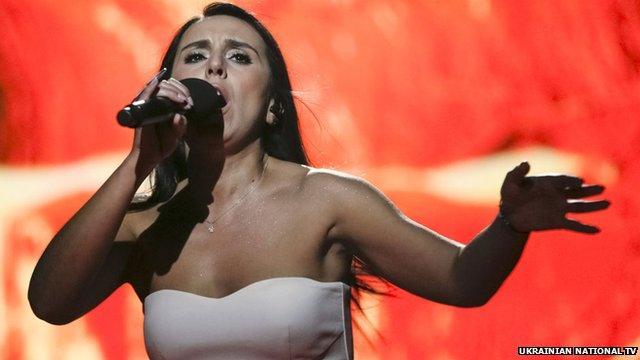Eurovision 2023: Jamala on rescuing Crimean folk songs from Russian invasion
- Published
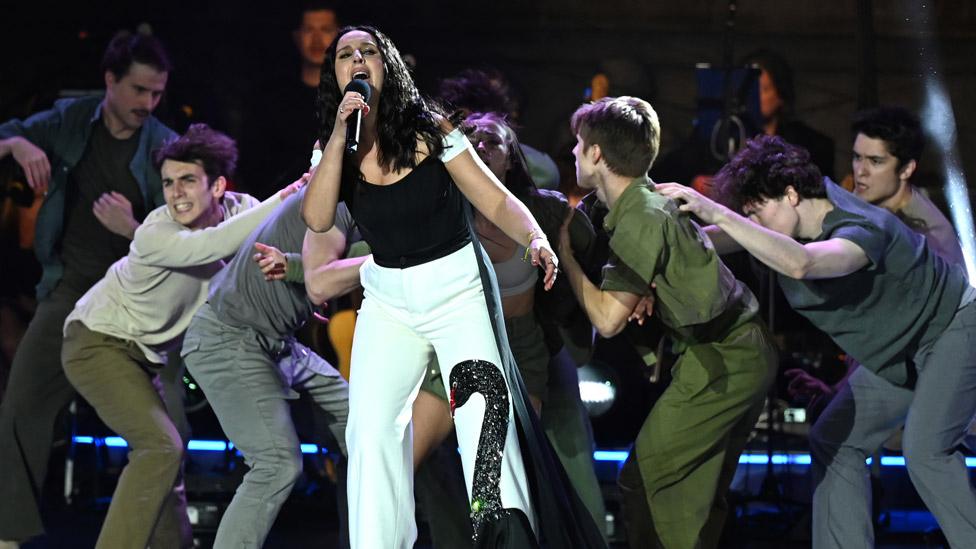
Jamala performed with the United Ukrainian Ballet at a concert before Eurovision in Liverpool on Sunday
After winning the Eurovision Song Contest in 2016, Ukrainian singer Jamala set about saving the traditional music of her persecuted Crimean Tatar people. Then during the war in 2022, she feared the songs had been lost for good.
When Russia began its full-scale invasion of Ukraine last February, Jamala's first priority was to get her two young children to safety. After several days, they reached her sister in Turkey.
"My second goal, after 'where are my kids?', when we heard the sirens and everything, [was] 'where is my album?'"
Jamala had worked on the highly personal project for years - gathering "unknown, unreleased, forgotten" songs from folklorists and others who had handed them down over generations.
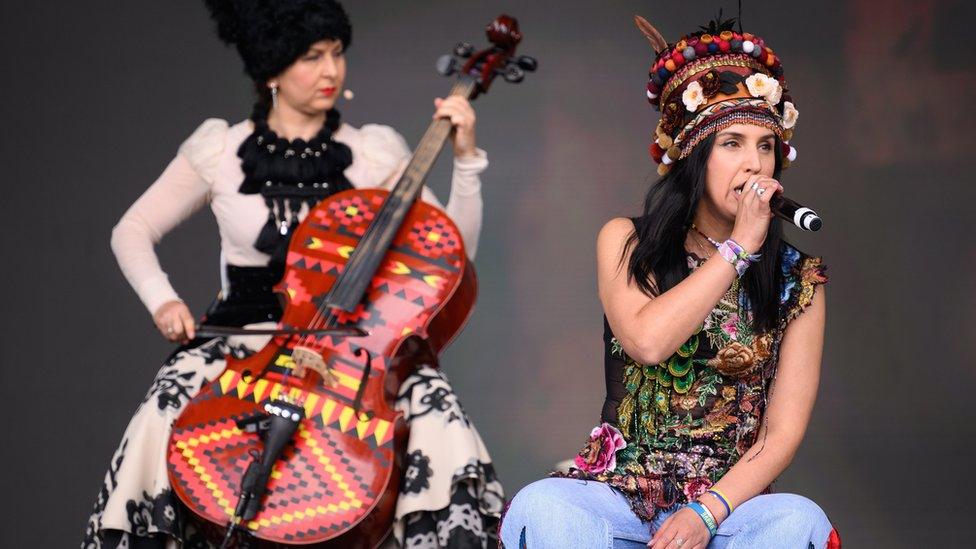
The singer joined Ukrainian group Dakhabrakha on stage at last year's Glastonbury Festival
"You can't find just Crimean Tatar songs [online]," the singer says. "It doesn't work like that. It's really unique songs. It's really hard work."
It is even harder for Jamala because she is banned from the disputed region, which was annexed by Russia in 2014 in a move that most of the world regards as illegal.
In 2016, she won Eurovision with 1944, a song inspired by the forced deportation of many Crimean Tatars by Russia in the year of the title. While overtly political songs are not allowed in the song contest, many also saw a clear message about the modern annexation.
Russian authorities have forbidden her from going there. So people secretly sent her songs, then she recorded them with more than 80 traditional and orchestral musicians.
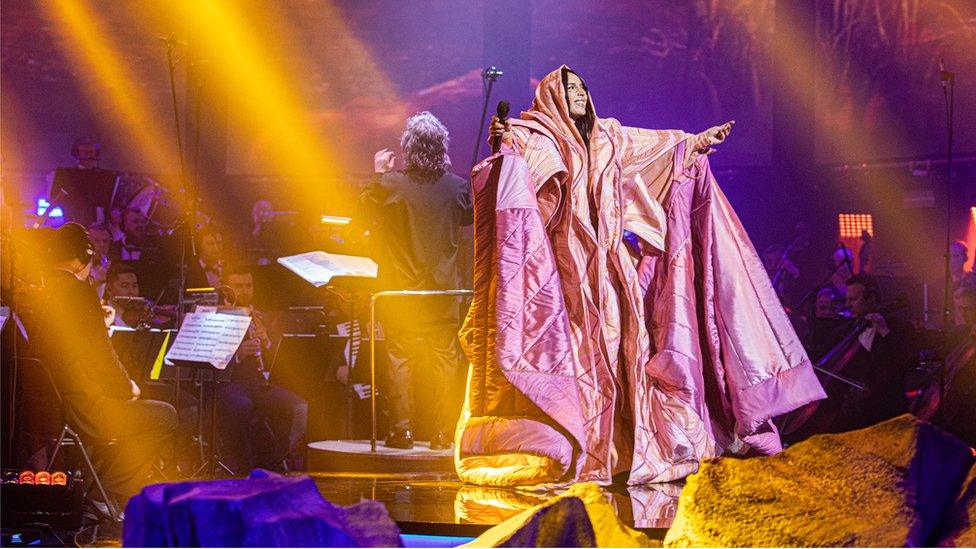
Jamala performed some of the songs with an orchestra in Kyiv last week
The album had got to the mixing stage in a recording studio near Kyiv when the Russian bombardment began last February. But she could not get there to recover the recordings, and there were no copies. "It's a war. It's really dangerous. We almost lost it," she says.
It took producer Sergei Krutsenko a month to reach the studio. He set about uploading the songs, but the internet connection was so bad it took three hours to do each chunk, Jamala says. "He woke himself up every three hours. It took two weeks do it.
"When there is a will, there is a way."
Concert bomb scare
The album, titled Qirim, finally came out on Friday. She performed some songs with Ukraine's National Symphony Orchestra in Kyiv last week - but that show was delayed when all the musicians, conductor, engineers and Jamala herself had to take refuge in a bomb shelter when an air raid siren sounded.
She will now give the whole album its live premiere with the BBC Philharmonic for thousands of fans at the Eurovision fan village in Liverpool on Thursday as part of the EuroFestival.
"I'm really so excited," she says, speaking in the city. But she's also "so scared because can you imagine singing for an audience in the Crimean Tatar language for a whole concert?
"But I'm sure that if you do something with whole love, people understand you. When I had only one chorus in 1944 in the Crimean Tatar language, everyone in Ukraine told me that, 'Oh, Europeans won't understand'. But they felt my emotions."
After Thursday's concert, Jamala will perform 1944 during the Eurovision grand final on Saturday as UK organisers try to ensure Ukraine has a voice this year.
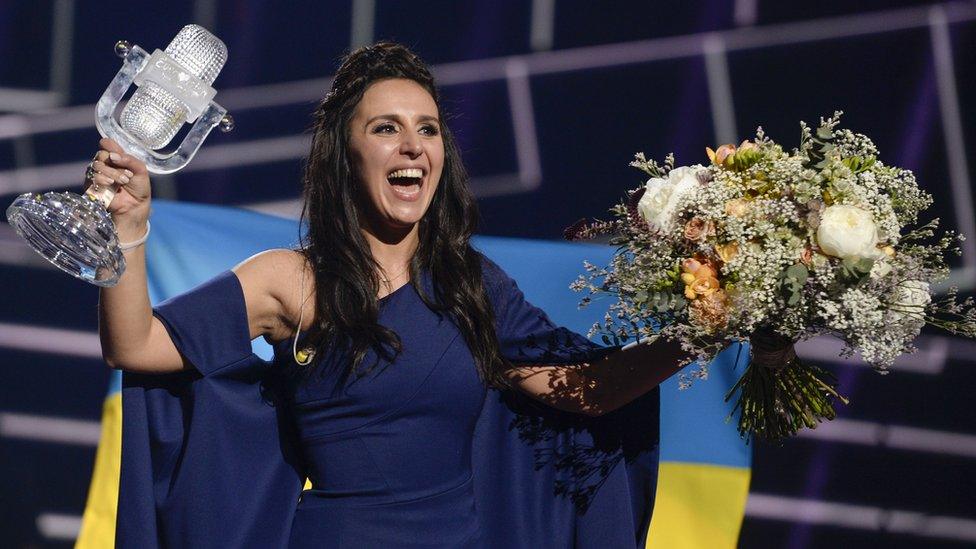
Russia complained that Jamala's Eurovision-winning song should have been ruled out for being too political
The song was inspired by her great-grandmother, one of about 200,000 Crimean Tatars who were deported in cattle trains without food or water in 1944.
"She was with five kids in her arms. Can you imagine, she brought back her four sons to the Crimea. But during this trip, one daughter died. She told me about that. I remember. I was little, but I remember it so clearly."
When the song won seven years ago, there was some controversy about whether it broke Eurovision's no politics rule. Organisers allowed it, and it eventually upset the odds by pipping Russia to the title.
"Russia really wanted everyone to accept this song as political," Jamala says. "Actually, they spent a lot of money for this. They did a special TV show and so on just to say, 'Oh my God, there's something political in this song.' But anyway, the people understand the truth."
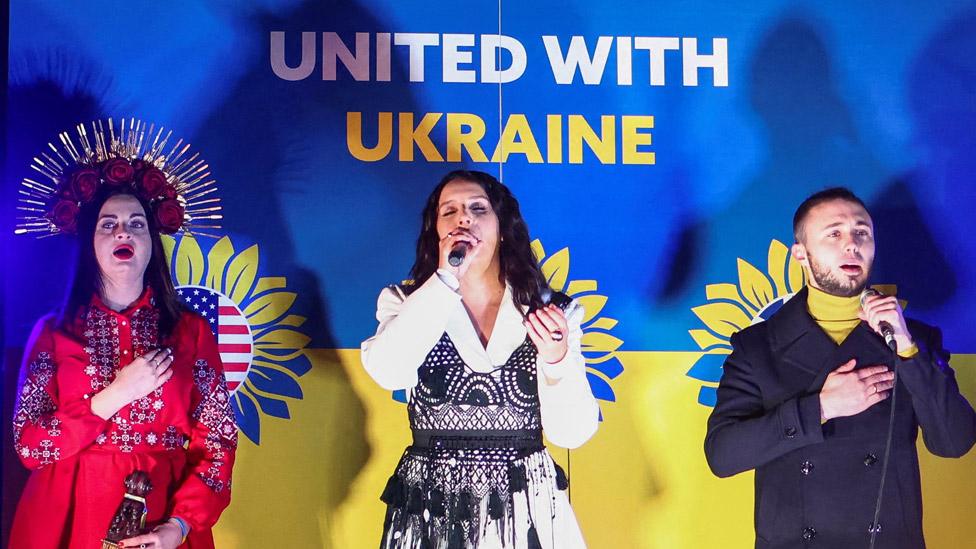
Jamala (centre) sang at a vigil in London on the anniversary of the Russian invasion in February
Some songs on Qirim are several hundred years old and tell stories about folk heroes like Alim Aidadmakh, who is described as the Tatar answer to Robin Hood.
"Each of them are like a diary, like personal stories like about the character," Jamala says.
"It's not just an album for me. It's not only music. It's something more.
"It's my try to give strong voice to my homeland, to Crimea. The centuries of the Russian Empire, then Soviet Union, now Russia - they did a lot of propaganda to shut us up. Then they told the whole world we did not exist.
"But we know the truth. I know the truth. And so that's why for me, it's really important to show this truth through the stories behind each of the songs in this album."
These stories and do not directly relate to the current conflict - until the final track.
Jamala decided to add the sounds of real missiles and air raid sirens on top of the dramatic orchestral arrangements, to give a sense of what was happening in Ukraine when this record was being completed.
"That's why I added these sounds in this outro, to be honest with my listeners about what happened exactly with this album," she says.

A look back at must-see Eurovision history: scandals, juicy moments & controversy.

Related topics
- Published5 May 2023
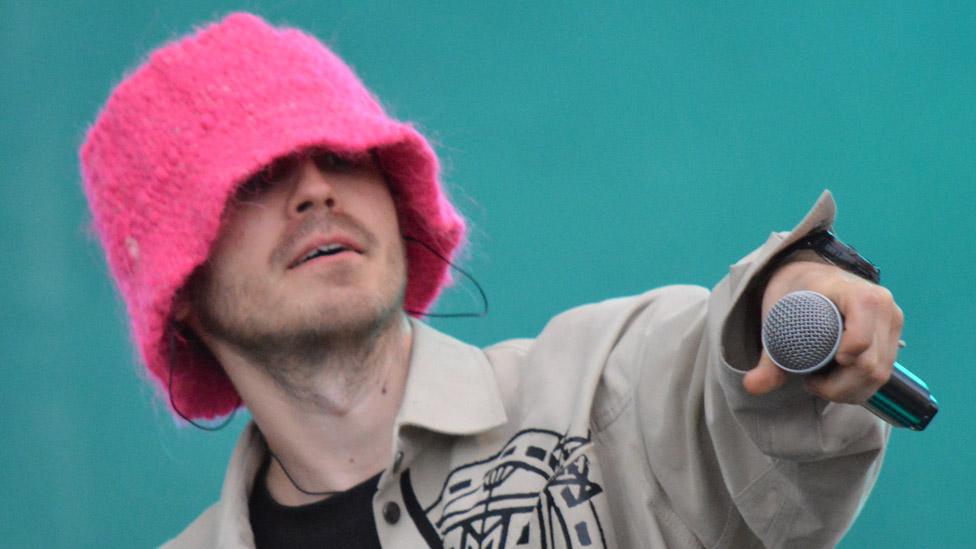
- Published19 April 2023

- Published28 March 2023
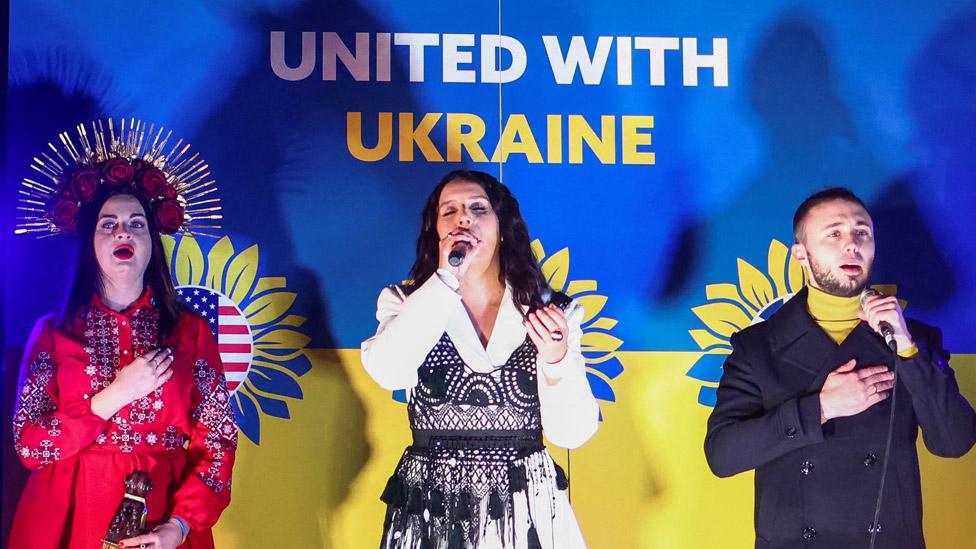
- Published12 May 2023
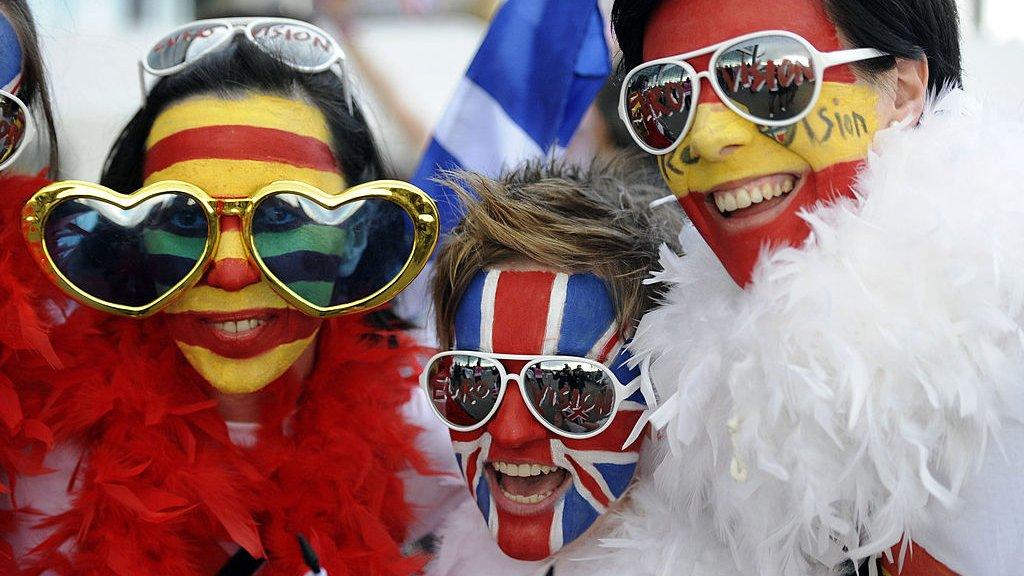
- Published15 May 2016
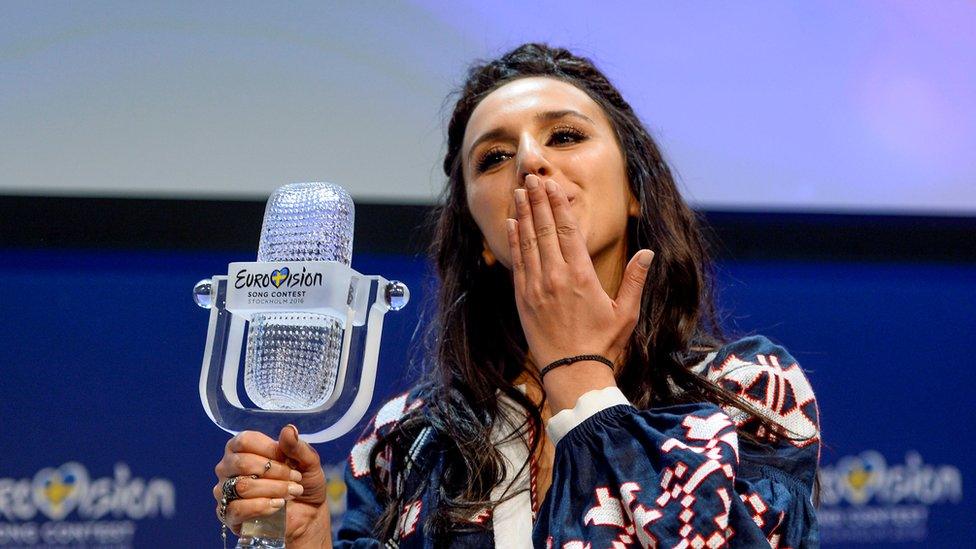
- Published12 May 2016
